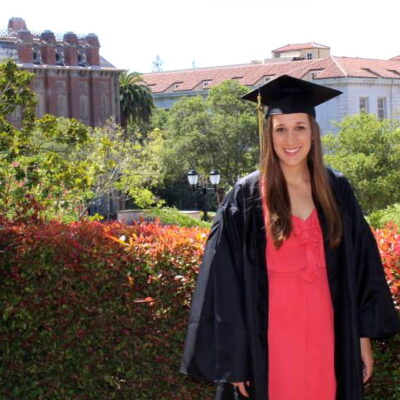Emily will begin her Master’s degree in Occupational Therapy at USC in the Fall of 2015 and may continue for a third year to receive a Ph.D. As part of her admission package, Emily has been awarded a research opporunity in the Pediatric Department with Professor Sharon Cermak.
Emily summarizes her 2014 thesis: In 1975 the Education for All Handicapped Children Act, addressed the inaccessibility of education for children with disabilities by requiring that all children with disabilities be provided a free appropriate public education (FAPE) (Individuals with Disability Education Act 1997). While IDEA has made significant gains in enrollment, the policy that education is provided in Least Restrictive Environment (LRE) has been undermined because of challenges in the implementation of the law (Yell 1998, 70-73). These discrepancies have influenced the requirements for determining the education setting for children with autism spectrum disorder who disproportionally account for almost one third of these published court decisions (Zirkel 2011, 92).
Using a multiple methods to examine the LRE, I will draw from historical analysis of LRE court cases, qualitative surveys of special education teachers and participant observations of CHIME Institute Schwarzenegger Community School. My specific research questions included 1) How does the model of disability that case law rulings draw upon establish or undermine a systematic and just criteria for determining implementation of LRE placement for students with autism? 2) How are special education teachers definitions of the purpose of education and placement of children with autism are influenced by the LRE policy? 3) Is the LRE policy compatible with structural components that are essential in a fully inclusive model of education for children with autism at CHIME Institute’s Schwarzenegger Community School?
I argue that LRE court decisions reflect the medical model of disability that locates disability as a problem within the child and not within the structure of the education system. Analysis of these court rulings and teacher attitudes exposes that the law does not account for how the removal of a child from the general classroom contributes to the disablement or limitation of opportunities to take part in the community on an equal level with others due to physical and social barriers. In surveys of special educators, teachers base their understanding of appropriate placement on the LRE policy, which is centered in a childs impairment. Observations of CHIME revealed that an alternative model exists, devoid of the LRE placement criteria, which creates a classroom setting where all children belong. The incompatibility of the LRE policy and inclusion uncovers how the absence of evolution in the definition of the least restrictive environment within the law, has constructed barriers limiting the participation of children with autism in mainstream education settings.
Emily recounts her time in ISF at Cal: Many UC Berkeley undergraduates have passions and interests beyond departmental boundaries. I came to Cal wanting to explore Education, Disability Studies, Gender and Womens Studies and Linguistics. Thankfully, I discovered the Interdisciplinary Studies Field Major, which capitalizes on students broad interests. In my studies, I explored the social theory of disability along with education theory and the history of global inequality. I was able to design a personalized curriculum and was supported by ISF advisors and faculty who genuinely cared about my ideas and cross-departmental interests.
I graduated in May 2014 and am working at Easter Seals Bay Area as a Behavioral Interventionist, where I implement Applied Behavior Analysis treatment for children on the Autism Spectrum. I am also working a few hours a week at the Center for Independent Living as an Independent Living Skills Instructor supporting adults with developmental disabilities. Because of the ISF program, I have the interdisciplinary framework to challenge the inequality and oppression faced by people with disabilities. I am passionate about directly incorporating disability rights and social theory into my future career as an Occupational Therapist. I am applying to graduate programs for a Masters in Occupational Therapy this Fall.
I am honored to have been in the ISF major because it provided me an innovative and empowering education along with an interdisciplinary perspective that I will carry with me in my future academic and professional endeavors.
